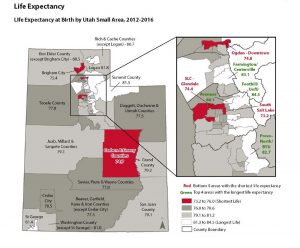Blog Post
Insight: Utah’s Social Determinants of Health: An Economic and Humanitarian Imperative
By: Laura Summers
Health is a key part of Utah’s economy. It is one of the largest industries in the state, employs a substantial number of people, supplies good paying jobs—and, as we all know, your own personal health can have a significant impact on your economic situation. Poor health can make it more difficult to find and maintain employment and serious medical emergencies can leave people with unplanned debt.
On August 17, 2018, the Gardner Policy Institute and the Hatch Center for Civility & Solutions jointly hosted the annual Kem C. Gardner Policy Symposium “The Root of the Issue: Utah’s Social Determinants of Health.” The symposium, convened by Governors Mike Leavitt and Mitt Romney, focused on strategies and innovations for addressing Utahns’ social determinants of health, which are the conditions in which people are born, live, work, worship, and play that affect their health risks and outcomes.
Research shows that non-medical factors, such a person’s social and physical environment, behaviors, and economic stability, account for up to 60 percent of their health outcomes, with genetics and the health care system making up the other 40 percent. As Karen DeSalvo, M.D. and national expert on social determinants of health stated at the event, “your zip code is a stronger indicator of your health than your genetic code.”
Looking at Utah’s zip codes, data show there is a more than a 10-year difference between neighborhoods with the highest life expectancy (the Avenues and Foothill) and the shortest life expectancy (Glendale and South Salt Lake). This is despite there only being about a five mile difference between these areas.

Fortunately, state and national leaders understand the importance of addressing social determinants of health and are looking for solutions. Symposium participants had an opportunity to hear from the newly appointed Senior Vice president for Health Sciences at the University of Utah, Michael Good, M.D., and Intermountain Healthcare’s President and CEO, Marc Harrison, M.D., who shared insights on an Intermountain pilot project focused on improving the lives of individuals in two Utah communities though social determinant of health interventions.
Several national experts also spoke at the event. Brett Giroir, M.D., Assistant Secretary for Health at the U.S. Department of Health and Human Services, discussed the opioid crisis and the impacts it has both nationally and in Utah. He acknowledged that opioid addiction is an incredibly difficult problem to fix, but it starts with addressing people’s social determinants of health. Adam Boehler, CMS Deputy Administrator and Director of the Center for Medicare and Medicaid Innovation (CMMI), engaged in a discussion regarding the future direction of CMMI and changes in policies and regulations that provide more flexibility to address social determinants of health. Karen DeSalvo, M.D., former Acting Assistant Secretary of Health at the U.S. Department of Health and Human Services, provided an overview of strategies being used across the country to address social determinants of health and how these actions can impact the future of health care in our state.
The Gardner Policy Institute and the Hatch Center chose social determinants of health as the focus of this year’s annual symposium because of its economic and humanitarian implications. As Utah’s population grows and its demographics continue to change, understanding the drivers of health can help us better address Utah’s changing health care needs and better help people maximize their economic opportunities.
The Gardner Policy Institute prepared a summary of Utah’s social determinants of health, which can be downloaded here. We will also be preparing a summary of the symposium for publication later this year. Sign up for our newsletter mailing list here if you would like to be notified.
We would also like to thank Sen. Hatch, Gov. Leavitt, and Gov. Romney for convening this terrific event.
Laura Summers is the senior health care analyst at the Kem C. Gardner Policy Institute.






